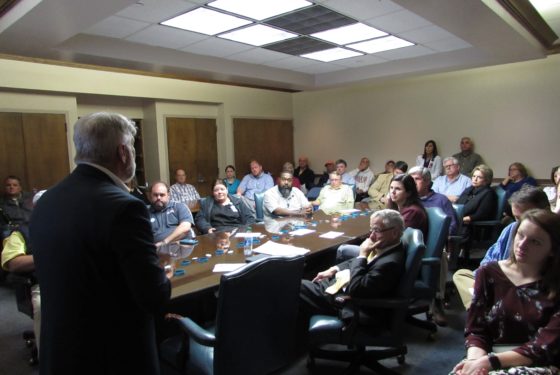Town Hall meeting focuses on tax vote

Nobody in the room was totally against the tax, but a few county residents expressed misgivings about what they saw as scare tactics or the burden of a tax on property owners.
Some 50 people crowded into the Whitfield Regional Hospital board room Tuesday night to witness CEO/Administrator Doug Brewer explain the reasons for the proposed 4-mill property tax, which goes before voters on Dec. 10.
He answered the questions of whether the hospital is viable, the need for it, its economic impact and what would be done with the money. He also debunked rumors that the Marengo County Commission would be taking a share of the tax for its own purposes.
Brewer, who has been criss-crossing the county with his presentation, said these are challenging times for hospitals, especially in Alabama where 11 rural hospitals have closed in the past few years.
It was just such a statement that had Scott Jones speaking out. He stated that he was opposed to the scare tactics claiming the hospital would close without the tax and frightening voters into approving it.
Brewer said the claims weren’t meant to scare. They were factual. The hospital would have to close immediately if the 50-year-old boilers quit working or its computer system failed. It has no way of replacing such equipment right away.
“We sat in a room beating our heads trying to figure out what to do” to find a reliable source of funding for the hospital, said District 2 County Commissioner Jason Windham.
“If this doesn’t pass, I don’t know any other option,” he said. “I don’t know what the answer is.”
Kevin Horne, who owns Amstar ambulance service, said if the hospital closes, he will have to shut down his business.
Good schools and healthcare are the most important amenities businesses and industry look for when considering a new location, said Brewer. While industry may not leave the area, no new ones will come in.
In addition, the 300 employees of the hospital, 80 percent of whom live in the county, will be out of work, and local businesses used by the hospital will also suffer.
A vote on a property tax up to 4 mills is allowed under Alabama law only if 100 percent of the funds is dedicated to a hospital or other approved medical facility. No other entity in Marengo County will receive any money
WRH got into its situation because it has no capital plan, Brewer said. A vote to approve a dedicated source of revenue from the tax would allow the hospital to apply immediately for loans to improve the facility, replace old or outdated equipment and purchase the latest technology.
Marengo County is one of the last counties with a hospital that has no dedicated tax revenue from city or county sources.
Since becoming CEO some 18 months ago, Brewer said he has been speaking to a lot of people to understand the medical needs of the area and whether the hospital can stay open.
Because of the lack of a capital plan, the hospital has had to constrict and cannibalize in order to stay in business, said Brewer. Those actions, however, have forced the sickest patients to go elsewhere, and the sicker the patient, the more Medicare reimburses the hospital.
Since Brewer came on board and the UAB hospital system became a partner, WRH has expanded services. Now those very ill patients are being treated locally, which is reflected in the hospital’s bottom line.
While he hopes operating revenue will continue to rise, it cannot be relied on to make the necessary repairs and expansions to the hospital.
“We have to have access to capital,” he said. The estimated $900,000 that will come from the tax “will not save us,” but it can be leveraged for loans.
The hospital does not own the building it is in. Brewer told the audience that he hopes the city will transfer the building ownership to the Tombigbee Healthcare Authority, which will provide even more capital to secure loans.
He promised that one of the first services to be returned to the area will be labor and delivery, which had to close in 2014. The unit never will make money, but the hospital owes it to the community to provide the care for mothers and their infants so they don’t have to travel more than an hour.
He said Marengo and its surrounding counties are among the least healthy counties in the United States, with high rates of diabetes and low birth weights. For that reason, WRH has opened a clinic in Linden and has plans in the works for two or more clinics within a 30-mile radius.
“We’ve got to do a good job to get into the community.”
Brewer pointed out how important the hospital is to the area economically. Through Medicaid and Medicare WRH receives about $17 million annually directly from the federal government. If the hospital goes away, so does that $17 million, he said.
“The landowner has no chance and no representation” in the vote, said Terry Barr, who added that he believed the passage of the vote is assured.
“I wish I had your confidence,” Brewer said. He then explained that a property tax is the most solid source of funding and is a guaranteed source, unlike a sales tax.
Brewer will conduct another Town Hall meeting on the tax Thursday, Nov. 21, at 5:30 p.m. in the WRH board room and on Tuesday, Dec. 3, at 6:30 p.m. at Cornerstone Church in Linden.
